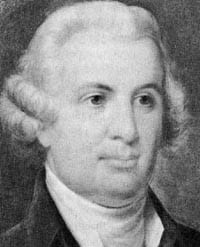William Hooper (June 28, 1742 – October 14, 1790) was a delegate from North Carolina during the Second Continental Congress. He served alongside Joseph Hewes and John Penn.
Before becoming infamous for his signature, he practiced law and served his community in North Carolina as a politician.
He was reluctant to vote in favor of the Declaration of Independence, and it would be fellow delegate Joseph Hewes who convinced him to vote for independence from Great Britain.
William Hooper's Early Years and Influences

Young William was born in the city of Boston on June 28, 1742, to a well-educated Scottish pastor. His father was an influential pastor of Massachusetts Bay and planned that his son would follow him into the ministry.
At the age of seven, William began studying at the Boston Latin School, where many influential founders of America studied in their formative years.
Hooper showed himself to be a great learner and quickly advanced to the top of his class and entered Harvard University as a highly regarded and decorated student. He would not disappoint and would graduate with honors from Harvard.
After graduation, Hooper decided that his abilities would best be served in the field of law rather than the ministry.
He began studying under the notorious James Otis, who was one of the most influential and radical lawyers in Boston. Otis had influenced men such as Samuel Adams, John Adams, and John Hancock and was one of the leading voices for independence.
After passing the bar, Hooper decided to leave Boston because of the lack of need for a lawyer and moved to North Carolina.
American Revolutionary War
In North Carolina, Hooper would begin practicing law and serving as a circuit judge. He would marry Anne Clark and establish himself as one of the leading men of North Carolina. The two had two sons and a daughter that survived to adulthood.
During this time, Hooper began exploring the field of politics and found much success.
His excellent reputation aided him as he quickly ascended up the political ladder. This would lead to him being selected as a delegate to the Continental Congress.
Hooper did not initially support the Declaration of Independence, and his past dealings had caused many to believe him to be a Loyalist.
Slowly, his fellow delegate Joseph Hewes began to convince Hooper to the side of independence. He would not be present for the vote for Independence but would sign his name to the document later, which would brand him as a traitor in the eyes of the British.
Due to financial problems, Hooper resigned from the Continental Congress in 1777 and began practicing law in North Carolina. He would be under continual stress throughout the war as the British tried many times to capture him.
In 1781, after the Battle of Guilford Courthouse, General Charles Cornwallis fell back to Wilmington, North Carolina, where William Hooper and his family resided.
Cornwallis would burn his estate, but Hooper and his family would escape, although they were separated for a time. During this time, Hooper relied on his close friends to take care of him.
They provided food and water to him and nursed him back to health.
Final Years and Death
Unfortunately, William Hooper would struggle in politics after the war due to his Federalist leanings. This great patriot became a victim of politics, and many branded him a loyalist, although he had suffered much for the American cause.
He would continue his law practice and serve as a judge. He was in favor of the United States Constitution and campaigned for North Carolina to ratify it.
Hooper became very sick and passed away on October 14, 1790, at the age of 48.
He left behind his wife and three children and would be buried in the Guilford Courthouse National Park.

